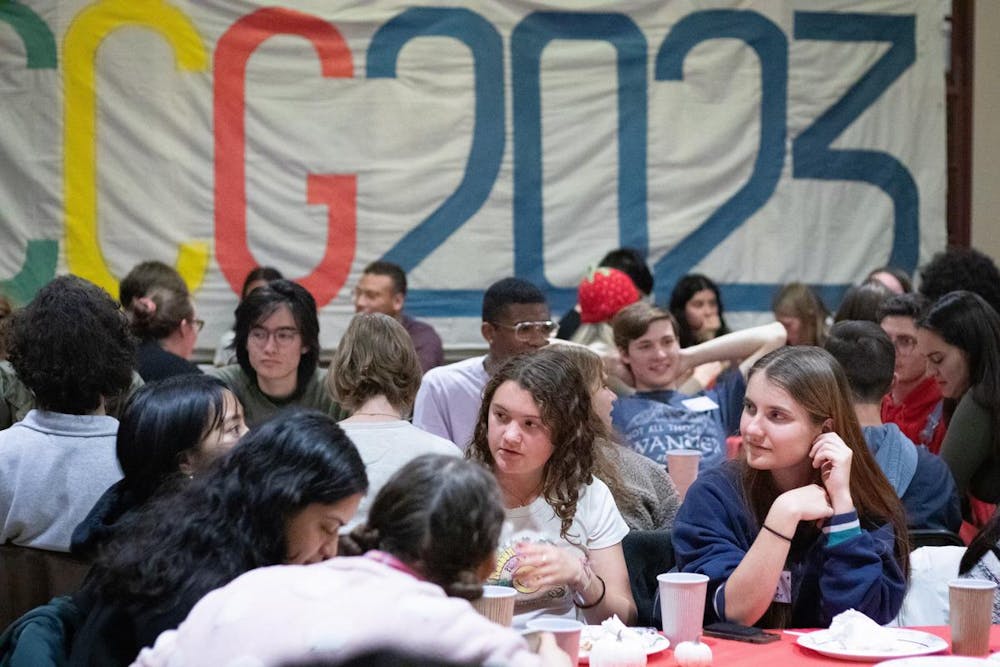Last weekend, more than 160 students from more than 40 universities across the United States and Canada convened on College Hill for the inaugural College Climate Gathering hosted by Sunrise Brown. From Nov. 3-5, participants attended workshops and panels centered around campus climate organizing and environmental justice, with the goal of bringing “a greater sense of community and purpose to the college climate movement,” according to Sunrise Brown’s website.
Sunrise Brown members first conceived of the idea nearly a year ago, according to Caitlyn Carpenter ’26, a Sunrise member and an organizer of the gathering.
“We thought actually teaching schools and planting the seeds for individual campaigns and stronger, larger organizing capacities at various institutions would be much more meaningful” than a singular “mass mobilization,” Carpenter said.
Planning for the gathering began in May, Carpenter said. By July, activists from five different universities had joined the organizing team.
The gathering was the first time in years that “this many schools (had) come together in one place to really talk about skill building” and “college climate organizing in an environmental justice lens,” Carpenter said.
“We tried really intentionally to reach into our networks — not only to get people from diverse backgrounds, but also people who are newer to the movement,” said Erin Mackey, a student at the University of Toronto and a CCG organizer.
The CCG also aimed to close the gaps in campus climate activism that had developed during the COVID-19 pandemic, organizers said.
“It was really hard to organize during (the pandemic) and build connections,” Mackey said. When students graduate, they “take the institutional knowledge with them.”
Organizers hoped that the conference would help address those challenges by fostering “an inter-campus foundation of institutional knowledge,” Carpenter said.
Roan Wade, a junior at Dartmouth, echoed that sentiment. “Part of our delegation of students that we brought from Dartmouth were freshmen, and so it was great to have them introduced to these really fundamental aspects of organizing work,” Wade said.
In advance of the gathering, organizers fundraised in order to subsidize the cost of transportation for attendees, said Garrett Brand ’26, a Sunrise member and conference organizer.
The group also received funding from several University departments and centers, including the Institute at Brown for Environment and Society, the Swearer Center for Public Service and the Nelson Entrepreneurship Center, Brand said.
“For a significant portion of the attendees, this was entirely free,” Carpenter told The Herald. “That was super important to us because in order to build a movement and ensure accessibility, you can’t have a cost barrier.”
CCG also helped arrange housing for visiting students, renting out sleeping bags from the Brown Outing Club and Brown Outdoor Leadership Training for them to use in students’ houses, according to Leo Worthington ’26, a member of Sunrise who helped organize the CCG.
“I was so impressed by them organizing places for students to sleep,” said Monet Paredes, a senior at the University of Connecticut and a CCG attendee. “That was just super great — to have them actively trying to make it the best experience possible for us.”
According to Brand, the conference aimed to create spaces for conversations surrounding effective climate organizing.
“We’re not approaching this as if we’re teaching a bunch of other students how to do climate organizing,” he said. “We’re all coming together to have conversations and learn from each other and share skills.”
Faculty from various University departments spoke on the conference’s panels. Panels such as “The Role of University in Driving Social Change” and “On-Campus & Off-Campus Activism: Bridging the Gap” featured activists, professors, local politicians and University graduate and undergraduate students.
The conference also emphasized the importance of environmental justice in the climate movement in addition to the principles of anti-racism.
Organizers aimed to shift the “internal focus of the climate movement … away from traditional, exclusionary, very white and carbon-centric ideas,” said Brand, who moderated the “Confronting Environmental Racism” panel.
“I liked that (the conference’s) workshops were focusing on race and class privilege,” Paredes said. “That was very helpful to me, as someone who is a half-white, half-Latina organizer in a space that is super white.”
“It was just such an incredibly valuable experience to be able to talk to other organizers, learn about what they’re doing, learning from them, as well as be able to build those connections … growing into larger movements and solidarity,” Wade said.
Ashley Cai is a Senior Staff Writer from Los Altos, California covering the staff and student labor beat. She is a Brown-RISD Dual Degree studying computer science, IAPA and graphic design. She is also a member of The Herald's Tech Team.
Jennifer Shim was a University News editor at The Herald.





